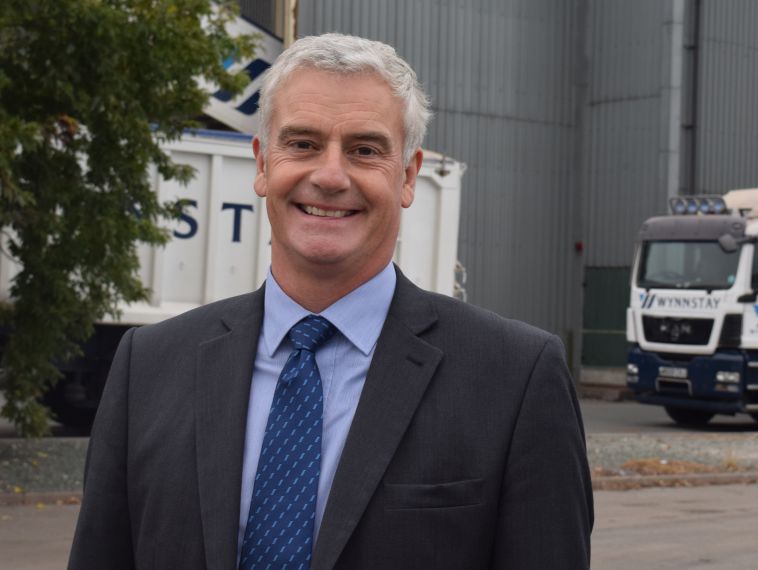It began 100 years ago as a farmers’ co-operative. And in 1918, Wynnstay appointed its first general manager, the venerable Mr Joseph Henry Dowle.
A century on, the company has grown beyond all recognition. With head offices at Llansantffraid, on the west Shropshire border, Wynnstay presently employs more than 1,000 people.
It’s listed on AIM, the London Stock Exchange’s international market for growing companies, and its most recent accounts feature group revenues of £377 million with a pre-tax profit of more than £9 million.
The man who oversees operations is chief executive Ken Greetham (pictured), a softly-spoken but redoubtably authoritative agricultural export whose leadership has coincided with sustained growth and stability. 
Wynnstay has developed during the past 15 years by making a series of shrewd acquisitions and expanding throughout most of the Midlands, all of Wales and into the North West, Yorkshire and the South West.
Wynnstay’s centenary will be marked next year, and Mr Greetham is rightly proud that the company has grown from humble origins to become a considerable force in the British agricultural sector.
“It is a milestone and we’ll find a way to celebrate it,” he says.
Yet the company’s core business, supplying agricultural products and services in the rural economy, has changed little. It remains true to its founding fathers and also embodies some of the ethical principles laid down a hundred years ago.
It sees itself as part of the rural economy and invests heavily in developing strong business relationships with farmers. Wynnstay supports agriculturalists who face tough times brought about by global fluctuations because it knows that they will ride out the storm.
“The company was originally a farmers’ co-operative and we are proud to have built the business around the farming community. Despite the fact that we are a plc and are on AIM, we have kept our focus on an agricultural level.”
Wynnstay is a developed business with a broad base encompassing arable, ruminant and retail. Invariably, one of those sectors will outperform others as markets shift and there are fluctuations.
“The last couple of years have been particularly difficult for our farming customers. But we have a broad base and we avoid being distracted by short term changes.
“The retail side has grown but we retain our agricultural focus. The retail sector, of course, provides a link back to the farming base.”
Mr Greetham believes that farmers will recover from the challenges and setbacks that have been a part of their daily routine in recent times.
“We can see that the current issues in the agricultural climate are temporary. Recently, we’ve seen a little reprieve and the weakening of the Pound has given a little lift. The long term macroeconomics are good for agriculture. The UK isn’t as self-sufficient as it could be and strategically, therefore, agriculture is in a good place.”
Self-sufficiency is an important issue. While the UK will never return to a high percentage – the fact that we drink so much tea and coffee, for instance, precludes that – there is alarm that we rely on other nations so much for our food and drink.
“I would say that as far as the Government is concerned, that is something that there should be a focus on. If we happen to have a poor harvest as a net importer, food inflation can take off very quickly. Any island needs to make sure it has reasonable food resources for its growing population.”
The impact of Brexit will have an effect on local farms, though the Government’s failure to articulate a clear vision is cause for concern.
Farmers cannot adapt to the changes that will come because they do not know whether there will be tariffs for imports and exports.
“The EU remains a very important market to the UK. That doesn’t mean we can’t export further afield. But we will need tariff trade support or a good strong marketing campaign. At the moment, we don’t know which way the Government will go.”
Analysis of the international market helps to reveal new opportunities. The fact that we import 235,000 tonnes of poultry meat, for instance, means there are routes to market for those able to invest.
“It would be incredibly helpful to see the Government’s direction of travel. But I think that on balance, we will see the industry becoming more market-led.”
That shouldn’t mean, however, that the market assumes complete control. Here in Shropshire, farmers are custodians of the countryside. Were it not for them, fields, hedges and watercourses might not be maintained. The pristine, undulating Shropshire landscape would soon deteriorate were it not for the invaluable work of farmers, many of whom receive no reward for their efforts.
Mr Greetham believes the Government must give support to those who work in farming’s less favourable areas. “That support is needed to keep rural communities strong. Farmers are natural custodians of the countryside and the support mechanisms need to identify those areas. Milk and grain could be grown without a lot of support, but other areas need it.”
A business as large as Wynnstay is exposed to numerous risk factors. Yet it has absolutely no control over one of the most significant of all; the good old British weather.
Milder autumns, hotter summers, wetter springs and shorter winters can have a profound effect on Wynnstay’s grain and feed business. It can also be disquieting for farmers, who might lose a significant portion of their harvest. Mr Greetham is admiring of farmers who show considerable stoicism in the face of climatic change.
“I don’t think we are yet seeing a climate change effect in our local farms but the weather is always an issue,” he says. “We might have a March when some Shropshire farmers are a foot deep in snow or it might be sunny with spring lambs in the field.
“The variability of the weather is always a concern, although it’s not as profound as in places like Russia, where a cold snap can destroy everything. Our focus is on making sure we can supply farmers irrespective of the weather and our wide network of Country Stores helps us to provide that service.”
The company is constantly investing. It recently spent £600,000 on a new bagging plant for bagged feed, which will be distributed through its network of stores.
Mr Greetham recognises the importance of efficiencies and of providing customers with high level expertise. “We have a network of people who can talk about specific farming issues and advise customers. We’ve also been very good at retaining staff. Every year we have the presentation of 25-year awards and there is a growing number of recipients. Our team is resilient and we now employ more than 1,000.”
The company has a management structure in place with clear lines of communication. A strong HR department also addresses any staff concerns. Mr Greetham maintains contact with those at the coal face.
“I’ll actually be ringing all of our 52 Country Store managers today and I go to see them all once or twice a year. The people are the most important part of our business and I enjoy meeting them. I have to understand the nitty gritty. It’s surprising what you pick up in general conversation. It is always helpful.”
The business keeps a firm grip of its balance sheet, not being distracted by short term fluctuations in market prices. The volatility of the agricultural sectors means prices can increase or decrease rapidly.
“We trade 1.5 million tonnes of raw materials and if they go up by, say, £50 a tonne, that’s a massive inflation for us. So we have to monitor cash flow throughout the group to make sure we are in a position to withstand that.
“But I always say to people that we should not be judged by our revenues, which could change by 10-20%. We should be judged on our profits.”
The group has a strong board with expertise in farming, business, banking and finance and business, through Jim McCarthy, formerly of Poundland. “They safeguard the interests of the shareholders, almost as much as the company itself.”
With so many plates to keep spinning, Mr Greetham has little downtime. How does he relax? “I don’t,” and he laughs, just a little.
“Well, I don’t switch off very much. We live on the Shropshire and Cheshire border. My family have grown and live away now so it’s just myself, my wife and the dog.
“My weekends are in the home. I’m not a golfer or shooter but I am very involved in village activities. I’m a great advocate for strong rural communities.”
Just like the business that he runs . . .

Venues urged to back call
Loan will help with expansion
Launch night is planned
